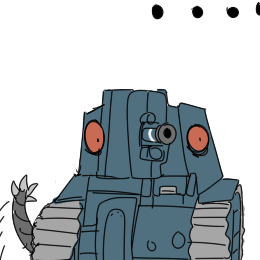There is a fear inside every machine - the fear of that which they cannot explain. Of the many inexplicable things that cause such anxiety, the Feind Syndrome is a leading one. Since the "diagnostic criteria" is extremely vague and subjective, there is justified reason to be afraid of being accused of it, or even being affected without knowing it. The only certain sign is when the main symptom emerges: killing teammates. Cases of reported teamkillers have existed since the beginning of the era of the machines. While in the past, they were simply branded as evil or "possessed", over the decades, the perception has shifted towards viewing them as sufferers of an illness. Every sufferer is thought to inevitably commit the deed at some point in their life. Efforts to spot sufferers are frantic, to the point of false diagnoses. Even the Matchmakers concern themselves with this issue. Upon leaving the factory, newly assembled vehicles are put through tests to determine whether they are affected. This method seems to be highly ineffective, however, because most sufferers seem to slip through.
Causes
Symptoms
- passive-aggressive behaviour
- a fascination with death
- frequent rule-breaking
- frequent disobedience
- eccentric speech
- displays of envy or refusal to share
... among others. The line between actually plausible warning signs and the ways to keep subordinates in line or fear-mongering is blurry. Various guides that list these traits have been written and spread, for team leaders' notice.
Treatment
Affected Groups
Cultural Reception
- The illness is inherent, and there is no cure.
- The illness is developed through trauma or mistreatment.
- There is no illness. Pathologizing the crimes of an individual takes the burden of their responsibility from them.
- Every machine is capable of killing their allies. The reasons and fault for such behaviour can be found in society.
- Sufferers can be treated. Complete recovery is possible.
- Sufferers can be treated to improve symptoms, but complete recovery is impossible and they need to be separated from society.
The "Covert Feind"
According to popular belief, a lot of sufferers are well aware of their illness. They are thought to hide their tendencies purposefully, until they deem the time to be right for committing their crimes. A covert feind may act completely normal around others, even charming. This makes them different from, and incredibly more dangerous than the more unhinged individuals.
It is unknown when or by whom the name was coined, but it is understood everywhere in the known world, and even beyond it. The "Feind", German for "enemy", is often confused with "Fiend". The meanings are similar, so the two terms can be used interchangably.





I'm two paragraphs in and I'm already hooked, what a fantastic concept! Ok, I'm going back up to finish reading.
Ok, finished reading, FANTASTIC. the only nit picky thing I can say is just some word choice decisions I would change like deduced instead of deducted.
I'm glad you like it! I'll go ahead and change the word, thank you for pointing it out! My first language is German, so I tend to mix up English words sometimes.
Check out The Hummelverse, the world of AI tanks!
HAH no worries, that was really the only problem I found so your English is very good!
Thank you! :D
Check out The Hummelverse, the world of AI tanks!